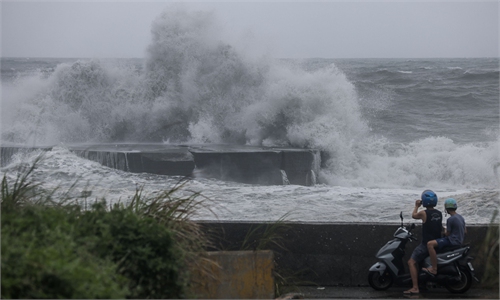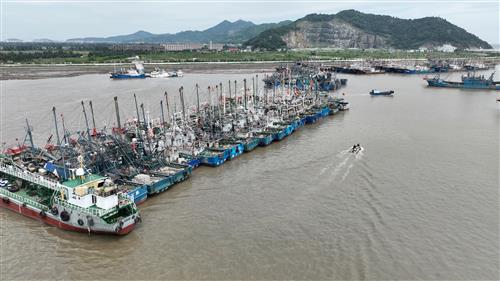36,000 people relocated, schools and public transportation suspended in E.China’s Fujian due to heavy rains caused by Typhoon Haikui

Typhoon Haikui drenches Fuzhou, East China's Fujian Province on September 5, 2023. Photo: IC
Sustained heavy rain linked to Typhoon Haikui has broken historical records in Fuzhou, East China's Fujian Province beating that of Typhoon Doksuri, leading to 36,000 people being relocated, and the suspension of schools and public transportation.
Between 9 pm on Tuesday and 5 am on Wednesday, 925 townships across seven counties, cities or districts in Fuzhou suffered a heavy rainfall with precipitation levels climbing above 250 millimeters, with a maximum precipitation of 439.7 millimeters in Gaishan town in Cangshan district, China Central Television (CCTV) reported on Wednesday.
The Wushan National Meteorological Station in Fuzhou recorded precipitation of 203.1 millimeters in three hours and 240.4 millimeters in six hours on Tuesday, breaking the previous record of 185 millimeters in three hours and 192.7 millimeters in six hours set by Typhoon Longwang in 2005.
The intensity and volume of rainfall exceeded that of Typhoon Doksuri which made landfall in Fujian in late July.
According to the city's flood and drought control headquarters, 49 reservoirs among the total 420 reservoirs around city had exceeded flooding limits, and over 80 locations across the city's downtown area were subject to extreme waterlogging with pools of water measuring 1.4 meters on the ground and nearly 4 meters deep in one underpass.
As of Wednesday morning, 147 townships with 51,272 residents have been impacted by the typhoon, among whom 36,026 people had already been relocated.
The rainstorm has caused direct economic losses of 552 million yuan ($75.51 million) flooding farmland, and damaging roads and bridges, while also sweeping away property and cutting power lines.
Due to the influence of Haikui, public transportation including subway, buses and railway operations in Fuzhou have all been suspended as of Wednesday morning. Local traffic police call for residents to remain indoors unless travel was deemed essential.
Fuzhou city's education bureau issued a notice on Tuesday night to extend the suspension of classes across local primary and middle schools, kindergartens and training institutions on Wednesday starting from Tuesday morning.
The Fujian Department of Natural Resources and Meteorological Bureau jointly issued a red alert on Wednesday morning for geological disasters in Minhou county, Yongtai county, Fuqing city and Xianyou county in Putian city, CCTV reported.
As Haikui weakened to become a tropical depression and moved southwestward at a speed between 5 to 10 kilometers per hour, heavy rains will continue to buffet most parts of Fujian, central and eastern parts of Guangdong, southern Jiangxi, southeastern Hunan, central Hainan and western Taiwan between 8 am on Wednesday and 8 am on Thursday.
Meanwhile, the 13th typhoon of this year Tropical Cyclone Yun-yeung has been formed in the northwest Pacific Ocean on Tuesday and has been moving northeastward at the speed of 30 to 40 kilometers per hour gradually increasing in strength.
Statistics released by China's Ministry of Emergency Management on Wednesday show that 8.887 million people suffered from natural disasters in August, including 168 people who died or went missing, 547,000 people were relocated, 11,000 houses collapsed and 29,000 houses were severely damaged. The direct economic losses caused by natural disasters amounted to 34.19 billion yuan in the month.
In August, five typhoons formed in the northwestern Pacific Ocean and the South China Sea. The Typhoon Khanun made landfall on the coastal city Zhuanghe in Northeast China's Liaoning Province on August 11 and caused severe rainstorms across the northeastern part of the country, affecting 88,000 people and resulted in direct economic losses of 920 million yuan.
Global Times


